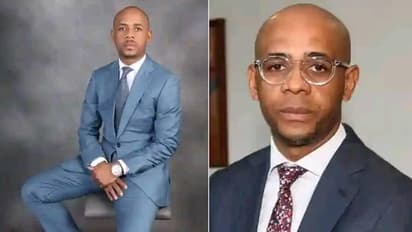Equatorial Guinea's anti-graft chief Baltasar Ebang Engonga caught in scandal over 400 sex tapes, Govt reacts

Synopsis
Baltasar Ebang Engonga, the Director General of Equatorial Guinea's National Financial Investigation Agency (ANIF), has found himself embroiled in a scandal that has sent shockwaves through the country.
Baltasar Ebang Engonga, the Director General of Equatorial Guinea's National Financial Investigation Agency (ANIF), has found himself embroiled in a scandal that has sent shockwaves through the country. Following a fraud investigation, authorities discovered over 400 explicit videos allegedly featuring Ebang Engonga engaged in compromising situations with multiple women, including high-profile individuals.
The investigation, which initially aimed to uncover financial misconduct, led to a surprise search of Ebang Engonga's personal office, where officials found a trove of explicit content recorded on CDs. Reports indicate that the footage includes encounters with several married women, among them the wives of government officials and prominent figures, including Ebang Engonga's brother’s wife and the sister of the President of Equatorial Guinea.
The videos, which have reportedly circulated widely on social media, have caused a significant media uproar. Vice President Teodoro Nguema publicly condemned the actions, asserting that sexual relations in government offices are strictly prohibited.
“Given the abuse that has been shown on social media in Equatorial Guinea in recent days, and remembering that ministries are solely and exclusively for carrying out administrative work in support of the country’s development, sexual relations in offices are prohibited,” Nguema stated.
“Control mechanisms are already in place, and anyone who violates this rule again will be subject to disciplinary proceedings for indecent conduct and will be dismissed from their job," he added.
Ebang Engonga, who is married with six children, has held a significant position within ANIF, a body tasked with overseeing financial investigations and promoting transparency in Equatorial Guinea. However, this scandal marks a dramatic fall from grace for the 54-year-old economist, known colloquially as "Bello."
Local media platform Ahora EG reported that since October, the scandal has garnered unprecedented attention, with allegations revealing that some explicit encounters occurred within the confines of his office.
Equatorial Guinea's Attorney General, Nzang Nguema, addressed the legal implications surrounding the scandal, noting that while the videos suggest the women involved did not face coercion, consensual sexual relations could still carry risks, especially regarding the potential spread of sexually transmitted diseases. He reiterated the importance of creating a supportive environment for victims to report incidents of sexual abuse or assault.
Nguema stressed that the risks extend beyond the women involved, potentially affecting their partners and the wider community. “The possibility of a contagious disease being spread through these sexual interactions makes the situation even more critical," he was quoted as saying in a report in Punchng.com.
Equatorial Guinea Govt takes firm action
In response to the scandal, the Equatorial Guinean government announced the immediate suspension of all officials found to have engaged in sexual relations within the ministry offices. The Vice President underscored that these actions violate the Code of Conduct and Public Ethics Law, stating, “Ethics and respect are fundamental in our Administration,” and reinforcing the government's zero-tolerance policy for misconduct that undermines public trust.
"Today we will proceed with the immediate suspension of all officials who have had sexual relations in the offices of the country's ministries. The Government will take severe measures against these acts, since it constitutes a flagrant violation of the Code of Conduct and the Public Ethics Law. This action is a decisive step in our policy of zero tolerance towards behaviours that undermine the integrity of the public service. Ethics and respect are fundamental in our administration, and we will not allow irresponsible behaviour to compromise public trust. Responsibility and professionalism must be the pillars of our work as servants of the State," he wrote in a post on X on Monday.
"The Government will soon implement the installation of surveillance cameras in all offices of State bodies. We have taken this measure to ensure compliance with the law on public officials and to eradicate improper and illicit behaviour. We will not admit any fault that denigrates the integrity of our administration and those who engage in these practices will face drastic measures," he further stated in a post today.
Who is Baltasar Ebang Engonga?
Born in 1970, Baltasar Ebang Engonga is an economist and long-standing public servant. According to Pulse.ng, he is the son of Baltasar Engonga Edjoo, a prominent figure who currently leads the Economic and Monetary Community of Central Africa (CEMAC), a connection that has positioned Engonga within powerful circles in Equatorial Guinea.
Engonga earned a degree in economics and finance from the University of Malabo and eventually took on the leadership of ANIF, Equatorial Guinea’s National Financial Investigation Agency. In this role, he was tasked with directing financial investigations and enforcing anti-corruption initiatives, playing a crucial part in advancing transparency and accountability within the government.
Married with six children, Engonga’s family life has been strained by the recent scandal, which has cast a shadow over both his personal and professional integrity. Once a prominent figure in the nation’s fight against corruption, Engonga is now at the center of a scandal that underscores broader concerns about ethics among high-ranking officials in Equatorial Guinea.
Check the Breaking News Today and Latest News from across India and around the world. Stay updated with the latest World News and global developments from politics to economy and current affairs. Get in-depth coverage of China News, Europe News, Pakistan News, and South Asia News, along with top headlines from the UK and US. Follow expert analysis, international trends, and breaking updates from around the globe. Download the Asianet News Official App from the Android Play Store and iPhone App Store for accurate and timely news updates anytime, anywhere.